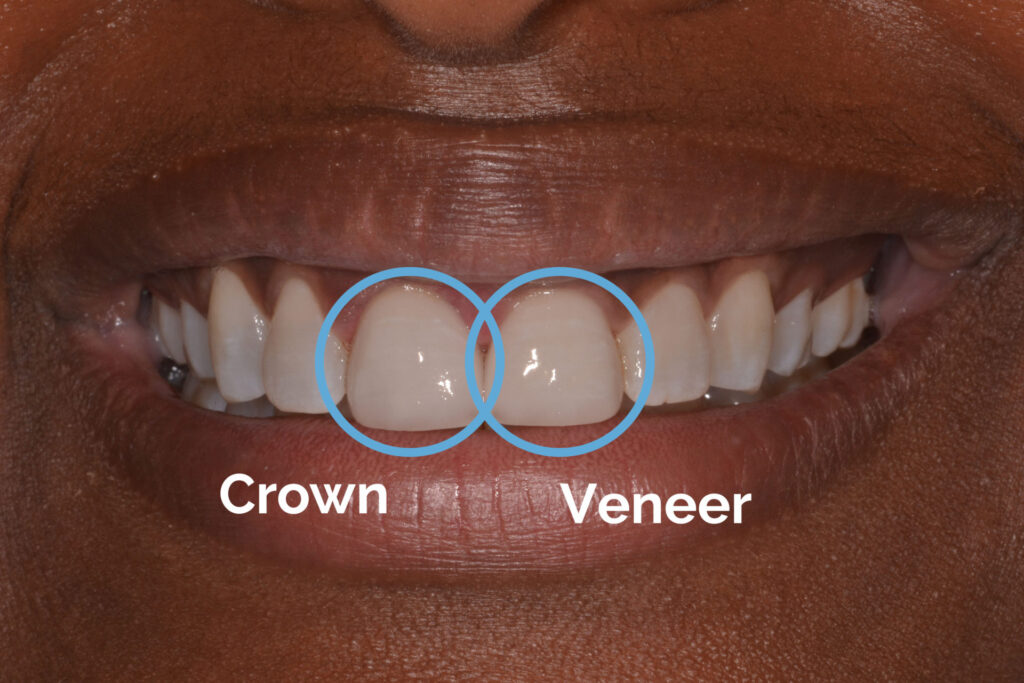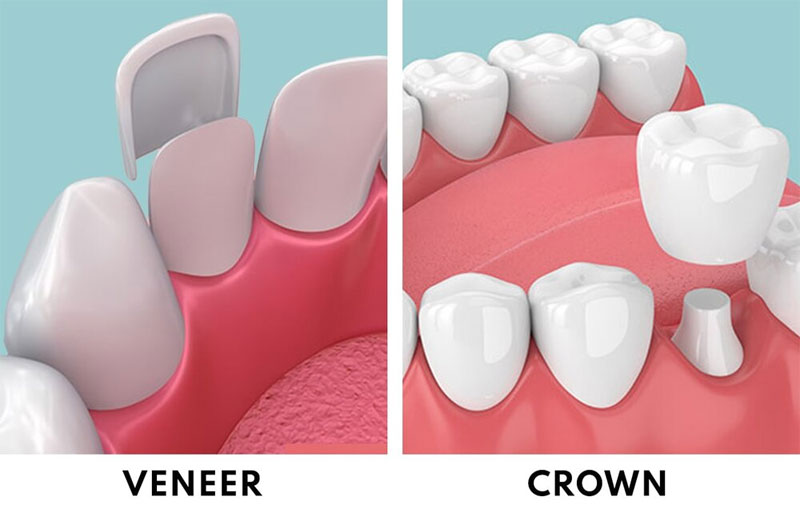Two of the first treatments that are typically mentioned when discussing ways to improve your smile or restore it as close to its natural state as possible are veneers and crowns. Both can give you a pleasant smile and increase your oral function. Still, they are incredibly different in purpose, design, form, and how they are used. The choice is specific to which kind of work needs to be done, your desires for an aesthetic result, and the guidance you receive from dental care. Here, we will provide a detailed comparison between veneers and crowns and their differences so that you can make the right choice for yourself based on your requirements.
What Are Veneers?
Dental veneers are thin, personalized shells of tooth-colored materials that cover the front surface of a tooth. They are made from porcelain or composite resin, and they are bonded to your teeth to improve appearance. Veneers are mainly used for cosmetic reasons, and they’re a good pick if you’d like to fix chips, gaps, and minor alignment issues to have a perfect smile or to reshape or lengthen your teeth. Veneers cover only the front of your teeth, and they can give you a perfect smile without much alterations done to your actual tooth.
What Are Crowns?
Crowns go a step further than fillings and cover the entire tooth structure down to the gum line. Crowns are most often fabricated from porcelain, ceramic, or a combination of these for increased strength and coverage. Perfect for repairing and reinforcing a tooth that may have been severely damaged or broken or is treated with a root canal or weakened by a large filling. Since crowns cap the entire tooth, they not only protect teeth but also restore their structure, making them a great solution for extensive restorative needs in one or more of your pearly whites.
Critical Differences Between Veneers and Crowns
Learning about the differences between veneers and crowns is crucial if you think that they are something beneficial for your teeth.
-
Coverage
Veneers cover only the frontal part of a tooth and, therefore, are best suited for teeth that can be seen. Crowns, on the other hand, are made to protect and support your whole tooth down to your gum line. Crowns provide full coverage, which is why they are ideal for teeth that require heavy restoration and strong reinforcement.
-
Purpose
Veneers are mainly reserved for cosmetic purposes or for patients who desire a better color, shape, or alignment of their front teeth. More often than not, they are used as a way to get that bright smile without extensive dental work needed. But, as well as hiding over your teeth, crowns also act to support and enhance the appearance of the rest of your tooth structure. Typically, they are used to reinforce a tooth that has been weakened due to decay or previous trauma or significant filing requirements in place on the teeth at once.
-
Materials
The type of materials that veneers and crowns are made out of also varies based on their purposes. Veneers are typically made from porcelain or composite resin. Still, they can be matched with the color of your natural teeth and have beautiful translucency. However, crowns are generally created from ceramic, porcelain, metal, or a combination of several other materials. This variety is why crowns are a practical solution for what type of tooth replacement.
-
Tooth Preparation
There is also a difference in tooth preparation when placing veneers and crowns. Most of your enamel remains structurally untouched with veneers, so the removal process does not create lasting sensitivity to hot and cold. The accuracy of porcelain veneer placement regarding marginal serial between restoration and natural teeth allows it to be one of the more conservative dental restorations. On the other hand, crowns must be made with more grinding down for a cap base to give teeth that have structural damage or decay an appropriate foundation.
-
Strength
Unlike crowns, veneers are strong only when fabricated and bonded over front teeth and not on molars, as they have more to do with appearance than resistance. As they are thicker and cover the full tooth, crowns can be appropriate for any tooth, even molars, which receive more force. This strength factor typically makes them a great choice for back teeth or any tooth that has been partially destroyed by conditions such as decay.
Although both crowns and veneers can help improve the look of your smile, a crown is usually better for teeth that need more support because they have been broken down or weakened by decay or injury.
How Long Do Veneers and Crowns Last?
Since porcelain veneers are stronger than their composite forms, be prepared for the fact that they will usually stay in your mouth for about ten to fifteen years if you take care of them, while composites, being relatively lower in strength, can last anywhere between only five to seven years. The durability of veneers depends on oral hygiene, such as brushing and flossing daily and regular dental visits that help monitor their health. Also, don’t bite hard materials and forget habits like chewing nails, and ice. In this way, you can prevent chips or fractures.
On the flip side, crowns generally have a slightly longer life expectancy than veneers, often lasting ten to fifteen years, with some lasting even longer with ideal care. Different materials and locations in the mouth contribute to their durability. Metal crowns tend to be the strongest, especially for back teeth. At the same time, porcelain and ceramic options are more aesthetically pleasing but may wear quickly. The placement of crowns also determines the best material, as molars require more challenging options due to the higher pressure they endure. Consistent care, such as regular cleanings, brushing, and avoiding hard foods, can help crowns last for many years.
Are Crowns and Veneers the Same?
Though crowns and veneers can both offer some of the same functions, they are treatments on opposite ends of the spectrum. Veneers are cosmetic procedures that use thin shells bonded on top of front teeth with minimal removal of enamel. They are mostly used to improve the look of a smile but not treat problems. When your teeth have any problem, crowns provide complete coverage of the tooth which leads to structural support and visual correction, so this will be best suited for teeth requiring significant restorations. They are stronger and more durable than veneers, especially in the case of back teeth, which can be used to restore cracked or broken-down molars that have substantial decay.
Caring for Veneers and Crowns and Tips for Long-Lasting Results
Begin with an optimum oral hygiene regimen; standard brushing and flossing are crucial as the decay resistance of veneers and crowns combats the cavity but doesn’t prevent bacteria from affecting the underlying tooth or gums. Avoid biting on hard items like ice, as this can chip or crack both veneers and crowns. Attend regular dental check-ups so your dentist can monitor the stability of these restorations, catching any issues early. If you experience stress-related grinding or clenching during sleep, using a night guard can help protect your veneers or crowns from excessive wear. Practicing regular care keeps your veneers or crowns in good condition while maintaining overall dental health.
Choosing Between Veneers and Crowns at Smile Plus Dentistry
At Smile Plus Dentistry, we understand that no two smiles are alike, and neither is the dental care they require. Here is what our process looks like if you are thinking about getting veneers or crowns with us. To begin, we will perform an evaluation that is designed to study your teeth and general oral health in detail, as well as strategically analyze your goals for improving aesthetics before finding which option fits best. From there, we will decide what the best treatment option for you is. We use only the highest quality materials to help ensure your veneers or crowns look natural and last for as long as possible. Finally, we will offer you good aftercare advice to make sure your new smile will last for many years.
Your smile looks its best with veneers and stays healthy with crowns. Let’s combine health and beauty for a stunning bright smile.
Contact us today for a consultation to see which option is best for you!
Final Thoughts
Suppose you have minimal tooth damage and are more concerned with aesthetics. In that case, veneers may be an excellent choice for enhancing your smile. Veneers can provide visual improvement but crowns are supportive when teeth have been significantly damaged or decayed and need extra stability and protection. If you are looking to get veneers or crowns and would like professional assistance in deciding what is best for you, feel free to contact us at Smile Plus Dentistry. Our skilled team focuses on providing you with a smile that looks and functions as good tomorrow as it does today.



No Comments